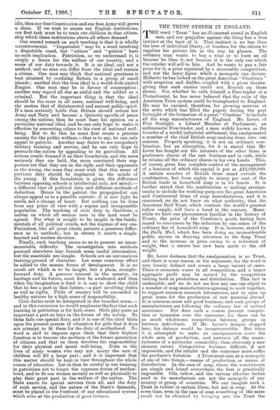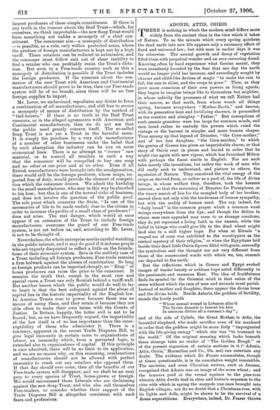THE TRUST SYSTEM IN ENGLAND.
THE word " Trust " has an ill-omened sound in English ears, and our prejudice against the thing has a true instinct at the back of it. That instinct is no less than the love of individual liberty, of freedom for the citizen to regulate his private life in the way he pleases. The ordinary man wants to buy a wine or to burn an oil because he likes it, not because it is the only one which the retailer will sell to him. And he wants to pay a fair price for it, a price regulated by a reasonable competition, and not the fancy figure which a monopoly can dictate. Hitherto he has looked on the great American " Combines " with suspicion and dislike, coupled with a pious thanks- giving that such exotics could not flourish on these shores. For, whether be calls himself a Free-trader or a, Protectionist, he has never believed that the evils of the American Trust system could be transplanted to England. He may be excused, therefore, for growing nervous at the news which has filled the papers during the past fortnight of the formation of a great " Combine " to include all the soap manufacturers of England. Mr. Lever, of Port Sunlight, a Liberal Member of Parliament, an enthusiastic Free-trader, and a man widely known as the founder of a model industrial settlement, has amalgamated a number of the chief British soap-making firms into one concern. Properly speaking, it is not an ordinary com- bination, but an absorption, for it is stated that Mr. Lever has bought out the interests of the other firms in preference shares of the new business and in cash, while he retains all the ordinary shares in his own hands. This, of course, gives him complete control of the management of a business of which the capital is put at £12,000,000. A certain number of British firms stand outside the combination, but from eighty to ninety per cent. of the British trade in household soap is in its hands. It is further stated that the combination is making arrange- ments to include for working purposes the great American and Continental firms of soap manufacturers, and it is rumoured, we do not know on what authority, that the American Beef Trust, which controls the world's greatest tallow supply, will have a hand in the concern. Mean- while we have one phenomenon familiar in the history of Trusts, the price of the Combine's goods having been raised to consumers by the reduction by one ounce of the ordinary bar of household soap. It is, however, stated by the Daily Mail, which has been doing no inconsiderable public service in drawing attention to the Soap Trust and to the increase in price owing to a reduction of weight, that a return has now been made to the old weight.
Mr. Lever declares that the amalgamation is no Trust, and there is some reason in his argument, for the word is very loosely defined and covers a large variety of cases. There is economic waste in all competition, and a larger aggregate profit may be earned by the competitors uniting both in production and distribution. This fact is undeniable, and we do not see how any one can object to a number of soap manufacturers agreeing to work together, to support common research laboratories, and to open up great areas for the production of raw material abroad. It is common-sense and good business, and such groups of manufacturers are following the ordinary law of mutual assistance. Nor does such a course prevent competi- tion or tyrannise over the consumer, for there can be as much wholesome competition between groups as between individuals. If Mr. Lever's designs stopped here, his defence would be incontrovertible. But when it is attempted to make an amalgamation cover the whole area of production, and embrace all the manu- facturers of a particular commodity, then obviously a new element enters. Competition becomes difficult, if not impossible, and the retailer and the consumer must suffer the producer's dictation. A Trust must aim at a monopoly of one of two things,—means of production, or means of distribution. In the case of soap, where the constituents are simple and found everywhere, the first is practically impossible. Oils, tallow, and the various alkaline bodies used in its manufacture are not the monopoly of any country or group of countries. We can imagine such a Trust in rubber or certain fibres, but not in soap. At the same time, even in the case of soap something of the same result can be obtained by bringing into the Trust the largest producers of these simple constituents. If there is any truth in the rumour about the Beef Trust—which, for ourselves, we think improbable—the new Soap Trust would have something not unlike a monopoly of a chief con- stituent. The commoner aim—a monopoly of distribution —is possible, as a rule, only within protected areas, where the produce of foreign manufacturers is kept out by a high tariff. There retailers can be reduced to submission, and the consumer must follow suit out of sheer inability to find a retailer who can profitably resist the Trust's dicta- tion. But even in a Free-trade country such as this a monopoly of distribution is possible if the Trust includes the foreign producers. If the rumours about the con- nexion of the new Trust with American and Continental manufacturers should prove to be true, then our Free-trade system will be of no benefit, since there will be no free foreign supplies to import.
Mr. Lever, we understand, repudiates any desire to form a combination of all manufacturers, and still less to secure a monopoly of means of distribution by the method of "tied-houses." If there is no truth in the Beef Trust rumours, or in the alleged agreements with American and Continental manufacturers, then we do not see that the public need greatly concern itself. The so-called Soap Trust is not yet a Trust in the harmful sense. It is simply the purchase by a very rich manufacturer of a number of other businesses under the belief that by such absorption the industry can be run on more economical lines. There is no attempt to " corner " raw material, or to control all retailers in such a way that the consumer will be compelled to buy one soap and no other at one price and at no other. Even if all British manufacturers were brought into the amalgamation, there would still be the foreign producer, whose soaps, im- ported free of duty, would provide the element of competi- tion which the consumer desires. We admit the hardship to the small manufacturer, who may in this way be absorbed to his loss ; but this is one of the normal risks of business, and does not involve the question of the public good. The sole point which concerns the State, " Is one of the necessaries of life to be made unduly dear to the citizen in order to increase the profits of a small class of producers ?" does not arise. The real danger, which would at once appear if an extension of the Trust to include foreign manufacturers overcame the guard of our Free-trade system, is not yet before us, and, according to Mr. Lever, is not to be thought of.
Nevertheless, the whole enterprise merits careful watching in the public interest, and it may do good if it induces people who are vaguely disquieted to reflect a little on the founda- tions of their economic system. Save in the unlikely case of a Trust including all foreign producers, Free-trade remains a firm bulwark against the abuses of combination. So long as foreign products can be imported cheaply, no " Ring " of home producers can raise the price to the consumer. It remains the truth that, except in the most rare and special cases, a Trust can only flourish behind a tariff-wall. But another lesson which the public would do well to lay to heart is that the best safeguard against the abuse of capital lies in the historic impartiality of the English law. In America Trusts rose to power because there was no means of suing them, and they retain it because they are able often to make their own terms with the Courts of Justice. In Britain, happily, the latter evil is not to be feared; but, as we have frequently argued, the impartiality of the law itself is of no less importance than the incor- ruptibility of those who administer it. There is a tendency, apparent in the recent Trade Disputes Bill, to give legal immunity in certain cases to organisations of labour, an immunity which, from a perverted logic, is extended also to organisations of capital. If this principle is once admitted, there will be no limit to its application, and we see no reason why, on this reasoning, combinations of manufacturers should not be allowed with perfect immunity to crush out any retailers who opposed them. If that day should ever come, then all the benefits of our Free-trade system will disappear, and we shall be an easy prey to every species of Trust, home-grown or foreign. We would recommend those Liberals who are declaiming against the new Soap Trust, and who also call themselves Free-traders, to consider whether their support of the Trade Disputes Bill is altogether consistent with such fears and professions.















































 Previous page
Previous page